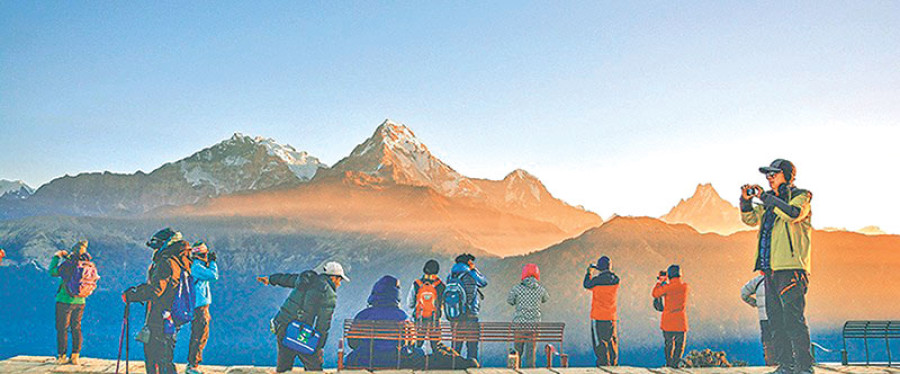Opinion
Branding tourism
Nepal’s tourism needs government’s policy support and a brand to reap its utmost benefit
World Travel and Tourism Council President and CEO Gloria Guevara Manzo rightly asserts “as one of the world’s largest economic sectors, travel & tourism creates jobs, drives exports, and generates prosperity across the world”. Inclusive growth and ensuring a future with quality jobs are the concerns of governments everywhere. Travel and tourism are important economic activities in most countries as it directly impacts the economy. As these sectors are linked to infrastructure, transport, hospitality, medical, educational and sports tourism, the political stability of a country is vital to reap its financial gains and propel its economy.
Tourism is turning into one of the strongest service industries in the world with its resilient power to sustain itself against all adversities. As a result, most countries look to tap the benefits accruing from this sector.
Though tourism is overwhelmingly under the clutches of the private entrepreneurs, government’s lip service along with partial ownership becomes the main obstacle in promoting and developing this industry. Government barely indulges itself in the tourism business in host of the countries, however their policy support and budgetary resource allocation keeps the tourism wheels rolling on. Tourism as a unique and multidisciplinary subject comprises amalgamation of economics and psychological variables hence does not fully follow the concept of market forces. In true terms, there are many variables that control tourism. For instance, volcanic eruptions that happened a few years ago in Indonesia and Iceland. The cloud of volcanic ash over Europe paralysed the entire global aviation industry as flights were cancelled for more than 10 days due to poor visibility. Similarly, dense winter fog in north India and Nepal disrupt flights creating immense cascading effects on the traveller’s or industry’s mood or trend.
Nepal’s wish of hitting the target of two million inward bound tourists by 2020 with series of campaigns could come to fruition providing proper policies on aviation, encouraging repeat visitors and partner promotions are executed. Energy for creating synergy is only possible if aviation, trade and government stand together with renewed zeal and synchronise their collective efforts. We have seen in many realms that until the government firmly stands behind the private sector, tourism industry has flourished nowhere. Nepal’s several tourism campaigns in the past were successful in unifying multiple sectors and inculcating a feeling of nationalism. Nepal is heading towards stability by practicing a new model of federalism. At this juncture, when all seven provinces are set to promote tourism as a core component of their provincial plans. The central government needs to encourage them and create a conducive business environment.
Creating a national brand with sub-national themes is another gigantic process, which we have to initiate soon. There will not be any denial in the sphere of intra-sub national competition to rope in as much benefits as possible from tourism amongst the competent sub-national players. At this point, participation of sub-national entities in national and international promotional platforms where they highlight their respective competencies would give a feeling of pride. It would certainly be good if Public Private Partnership sub-boards were established to properly reflect the genuine concept of bottom-up approach in formulating plans, programmes and policies at the sub-national levels too.
Fair play witnessed in the market forces would help enhance our aim of establishing Nepal as a quality and an attractive tourist destination. However, the bottom-line of keeping Nepal’s culture and tradition as a unique product should not be ignored in our plans and programmes. The day we forget our Nepali heritage and blindly mimic western trends to show case our products and offerings, we would fail in our attempt develop tourism as per our strengths. Hence, lets us comprehend tourism as a composite product rather than one dimensional offering—meaning catering to foreigners only.
Baral is the Senior Director at Nepal Tourism Board




 14.24°C Kathmandu
14.24°C Kathmandu










